Aug. 12, 2021
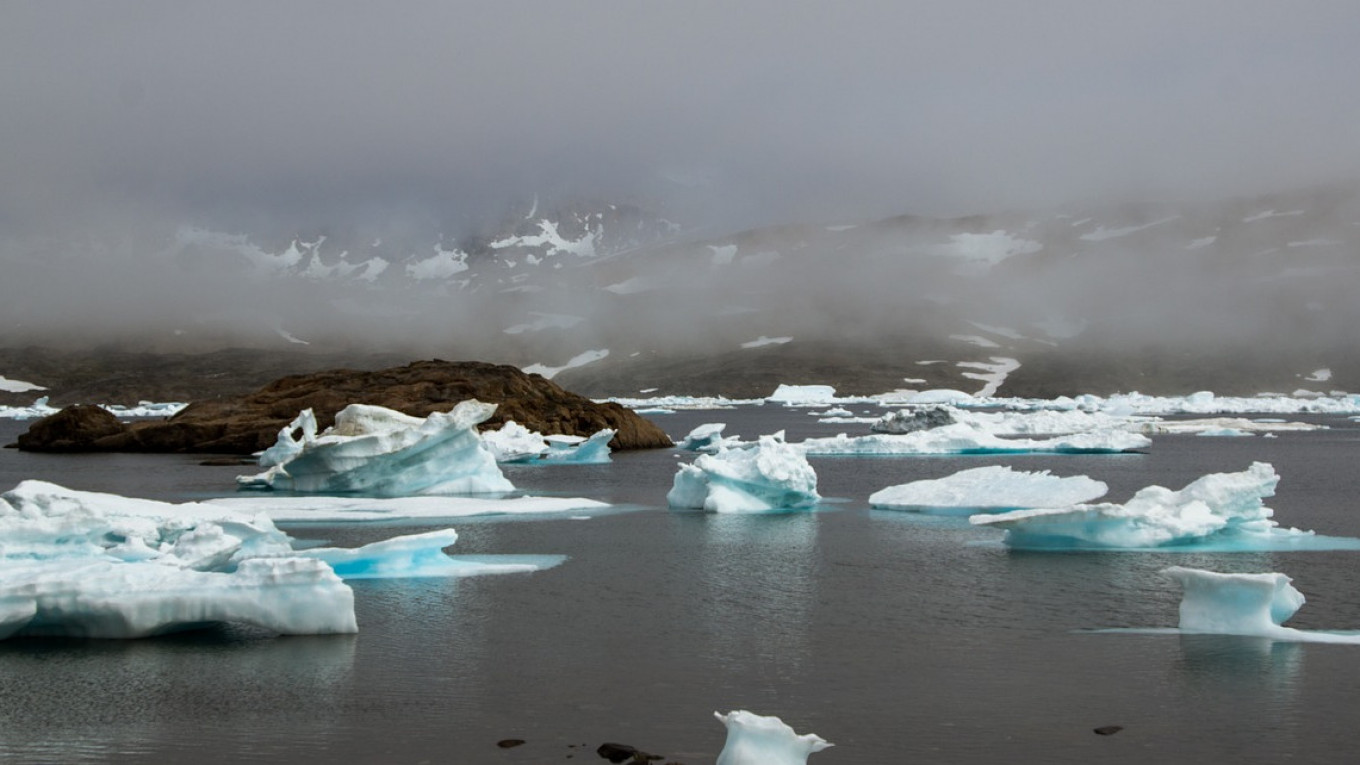
Experts believe that as permafrost melts, it will release an increasing amount of carbon, setting off a cycle of warming nearly impossible to stop.Taken / pixabay
Russia’s permafrost could deteriorate fast and spark an accelerating loop of warming if world leaders don’t heed UN climate scientists’ call to drastically cut global carbon emissions, an expert told The Moscow Times.
The Intergovernmental Panel on Climate Change (IPCC) report published Monday shows unequivocally that climate change is progressing more quickly than feared — with temperatures already 1 degree Celsius above pre-industrial levels — and that time is running out to prevent catastrophic warming. It expands upon the IPCC’s 2013 climate assessment, which came two years before nearly 200 countries signed the Paris Climate Agreement in hopes of keeping warming below 1.5 C.
“This IPCC report studies climate feedback effects in much more detail than the previous report,” the World Wildlife Foundation (WWF) Russia’s head of climate and energy research Alexei Kokorin said.
Large amounts of carbon are stored within permafrost, the layer of soil that stays frozen year-round and covers nearly 65% percent of Russia’s territory.
While this permafrost doesn’t currently emit much carbon, Kokorin said its emissions could increase tenfold by 2100 if global greenhouse gas emissions continue to rise at their current pace.
Experts believe that as permafrost melts, it will release an increasing amount of carbon, leading to warming that in turn melts even more permafrost — setting off a cycle of warming nearly impossible to stop.
Kokorin also said Russia can expect to see extreme weather events with increasing frequency, with once-in-a-decade heat waves happening every five years if global temperatures rise 2 C beyond pre-industrial levels and happening nearly every year if the planet warms by 4 C.
“That could affect whether people will choose to live in Moscow. If a heatwave like the current one happens every five years, you can see it as bearable. But what if it happens almost every year? Would we have to move the Russian capital to another location?” Kokorin said.
More detailed information will be available when Russia’s national climate assessment comes out sometime next year, Kokorin said.
While the IPCC report relied mostly on scientific articles published in English, the Russian report will also include a lot of material that hasn’t been translated into English yet, potentially offering a deeper understanding of Russia’s unique climate dynamics.
Russia’s permafrost could deteriorate fast and spark an accelerating loop of warming if world leaders don’t heed UN climate scientists’ call to drastically cut global carbon emissions, an expert told The Moscow Times.
The Intergovernmental Panel on Climate Change (IPCC) report published Monday shows unequivocally that climate change is progressing more quickly than feared — with temperatures already 1 degree Celsius above pre-industrial levels — and that time is running out to prevent catastrophic warming. It expands upon the IPCC’s 2013 climate assessment, which came two years before nearly 200 countries signed the Paris Climate Agreement in hopes of keeping warming below 1.5 C.
“This IPCC report studies climate feedback effects in much more detail than the previous report,” the World Wildlife Foundation (WWF) Russia’s head of climate and energy research Alexei Kokorin said.
Large amounts of carbon are stored within permafrost, the layer of soil that stays frozen year-round and covers nearly 65% percent of Russia’s territory.
While this permafrost doesn’t currently emit much carbon, Kokorin said its emissions could increase tenfold by 2100 if global greenhouse gas emissions continue to rise at their current pace.
Experts believe that as permafrost melts, it will release an increasing amount of carbon, leading to warming that in turn melts even more permafrost — setting off a cycle of warming nearly impossible to stop.
Kokorin also said Russia can expect to see extreme weather events with increasing frequency, with once-in-a-decade heat waves happening every five years if global temperatures rise 2 C beyond pre-industrial levels and happening nearly every year if the planet warms by 4 C.
“That could affect whether people will choose to live in Moscow. If a heatwave like the current one happens every five years, you can see it as bearable. But what if it happens almost every year? Would we have to move the Russian capital to another location?” Kokorin said.
More detailed information will be available when Russia’s national climate assessment comes out sometime next year, Kokorin said.
While the IPCC report relied mostly on scientific articles published in English, the Russian report will also include a lot of material that hasn’t been translated into English yet, potentially offering a deeper understanding of Russia’s unique climate dynamics.
Siberian Wildfire Could Become Biggest in Recorded History – Greenpeace
Updated: Aug. 12, 2021
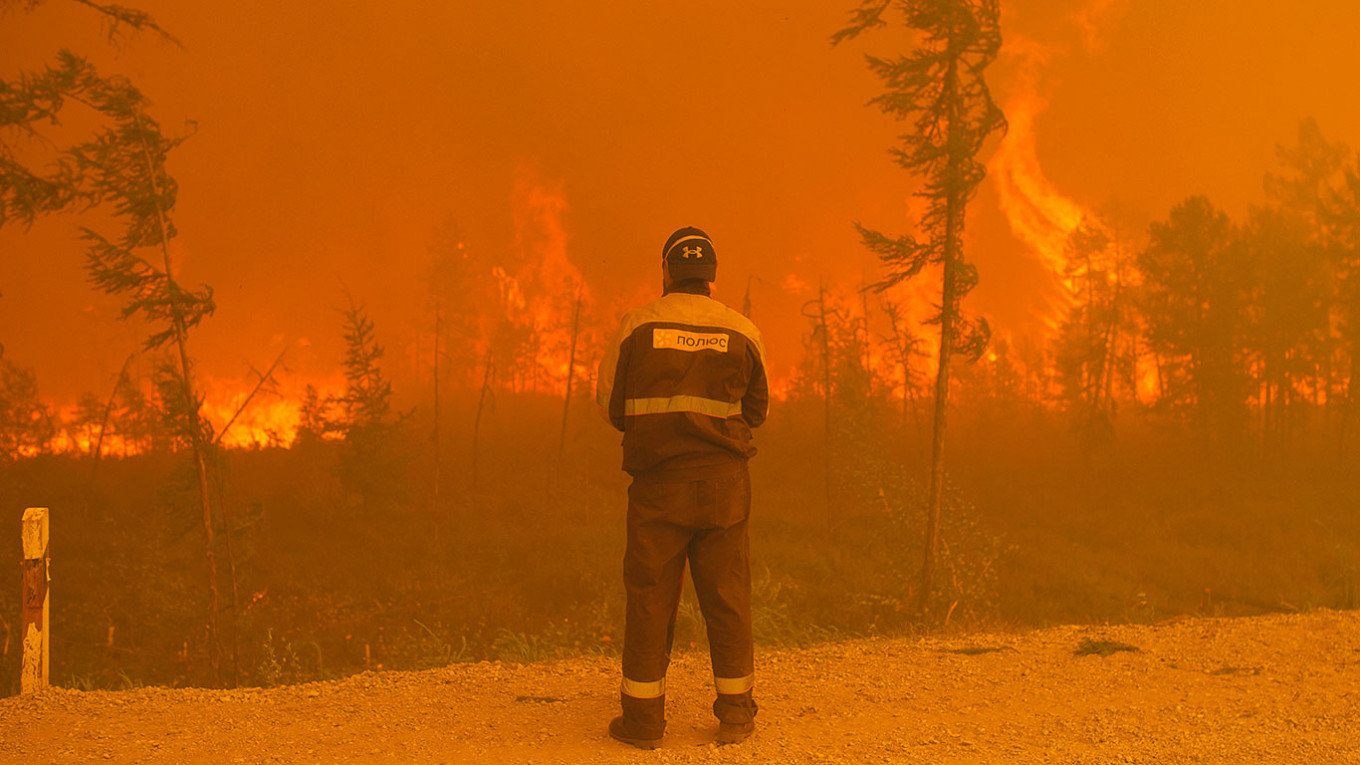
The largest of these fires has exceeded 1.5 million hectares in size, the Greenpeace environmental group's forestry head Alexey Yaroshenko told The Moscow Times.
“This fire has to grow by about 400,000 hectares to become the biggest in documented history,” Yaroshenko said. “It is impossible to contain this fire through human efforts. ... Firefighters would have to put out a line of fire 2,000 kilometers long.”
Only rain could stop or significantly slow down this fire, Yaroshenko said, but current rainfall is too weak to do so.
“In the best-case scenario we could save settlements and infrastructure that lies in the fire’s path,” he said.
Yaroshenko’s comments come days after a landmark United Nations climate report rang the alarm on global warming and called for more ambitious measures to prevent the climate from spiraling out of control.
Experts say Sakha’s fast-warming climate — the region has seen its annual average temperature rise by 3 degrees Celsius since the beginning of the 20th century — combined with a 150-year record drought and high winds has turned its vast taiga forest into a tinderbox.
Harmful forestry practices are a key factor behind the fires’ unprecedented spread, Greenpeace expert Yulia Davydova told The Moscow Times, as regional authorities aren’t required to extinguish fires in so-called “control zones” – areas far from human settlements. Logging, both illegal and legal, is another common cause, according to new data acquired by Greenpeace.
With weeks left to go in the wildfire season, the European Union’s Copernicus satellite monitoring service said that the Siberian forest fires have already emitted a record 505 megatons of carbon dioxide.
And satellite observations by NASA’s Earth-monitoring tool MODIS showed that smoke from the wildfires reached the North Pole for what is believed to be the first time in known history last week.
Nationwide, over 13.4 million hectares of land have been burned by wildfires — an area roughly the size of Greece — so far in 2021, Greenpeace says, citing official data.
Putin Alarmed Over 'Unprecedented' Natural Disasters in Russia
By AFP Updated: one day ago

Aysen Nikolayev, the head of Yakutia, said firefighters were able to save 230 houses from flames.
He said evacuated villagers had received psychological help, with local children being sent to holiday camps.
He called the scale of the fires a first "in history" and asked for help after the region's harvest was severely affected.
"We will continue to save more houses," he said, thanking Putin for his support.
This week Russia launched a national response centre and deployed additional firefighters to battle the devastating Siberian fires.
The governor of the southern Krasnodar region Veniamin Kondratyev said 132 people — mostly holidaymakers — had been evacuated in the Black Sea resort of Anapa last night amid rising floods.
"We could not predict what would happen at night," he said, adding that the region had "the same rainfall in a day as we usually get in a year."
Kondratyev said that despite difficult climate conditions, the holiday season in resort areas is "continuing and under control."
The head of Moscow-annexed Crimea, Sergei Aksyonov, said that two people have died as a result of floods on the peninsula and that over 3,000 have asked authorities for help.
Heavy smog hung over the regional capital of Yakutsk on Friday, which was declared a non-working day in much of the region over health concerns due to wildfire smoke.
For years Putin was notorious for his scepticism about man-made global warming and saying Russia stands to benefit from it.
But in recent months he has also made statements to the effect that climate change is not just a boon to Moscow.
The Russian leader this year participated in a summit hosted by U.S. President Joe Biden and said Moscow is interested in "stepping up international cooperation" on climate change.
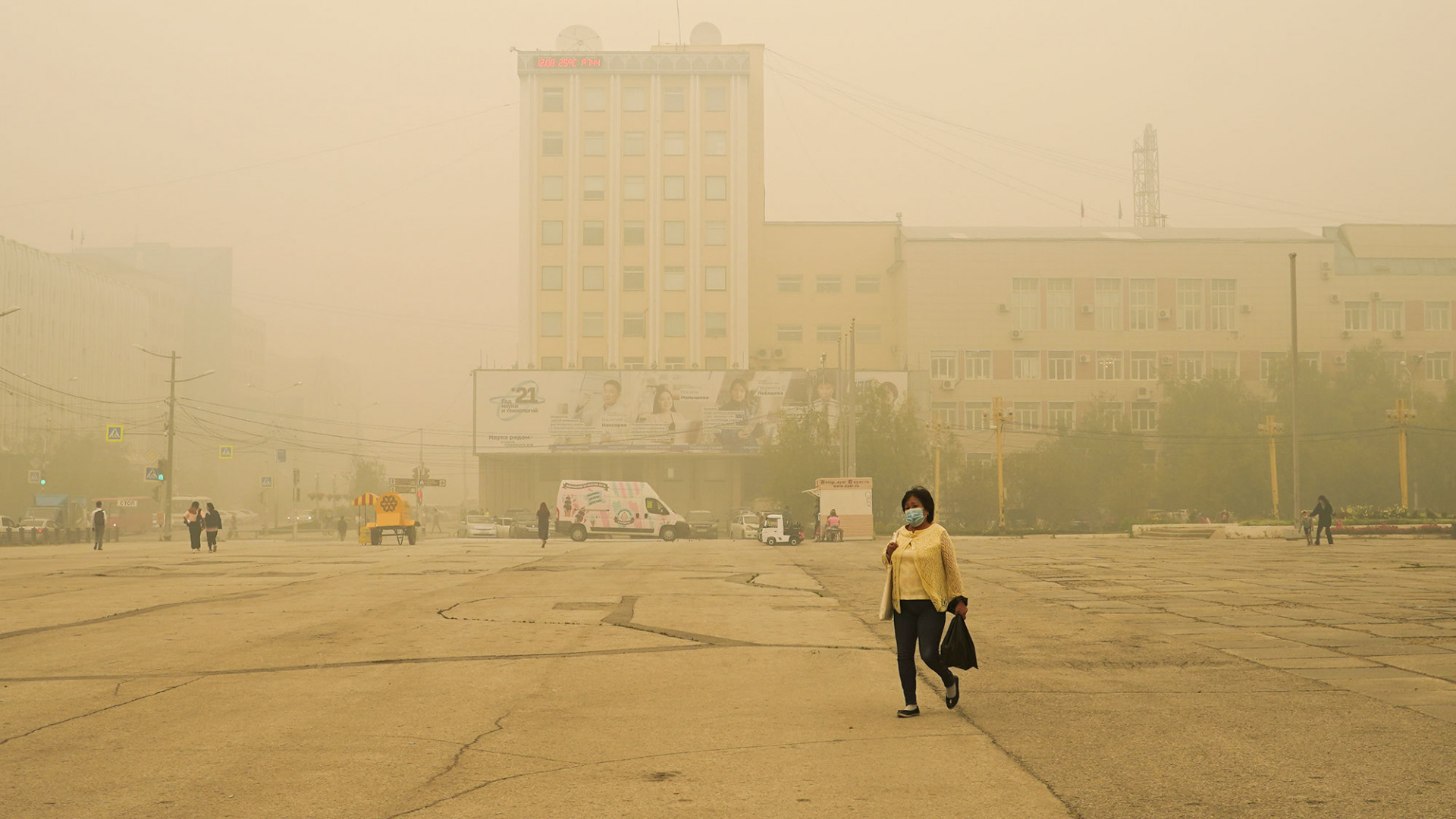
Smog from the wildfires in Yakutsk.
Vadim Skryabin / TASS
In Photos: Life Amid Siberia's Devastating Wildfires
Aug. 13, 2021 - 15:32
Russia’s largest, coldest region is blanketed by thick smoke from wildfires that have torn across the Siberian taiga at an unprecedented scale.
Authorities the republic of Sakha (Yakutia) have declared a state of emergency over the rapidly advancing fires and hazardous smoke.
Here’s a closer look at the scene from the ground that locals have described as “apocalyptic”:
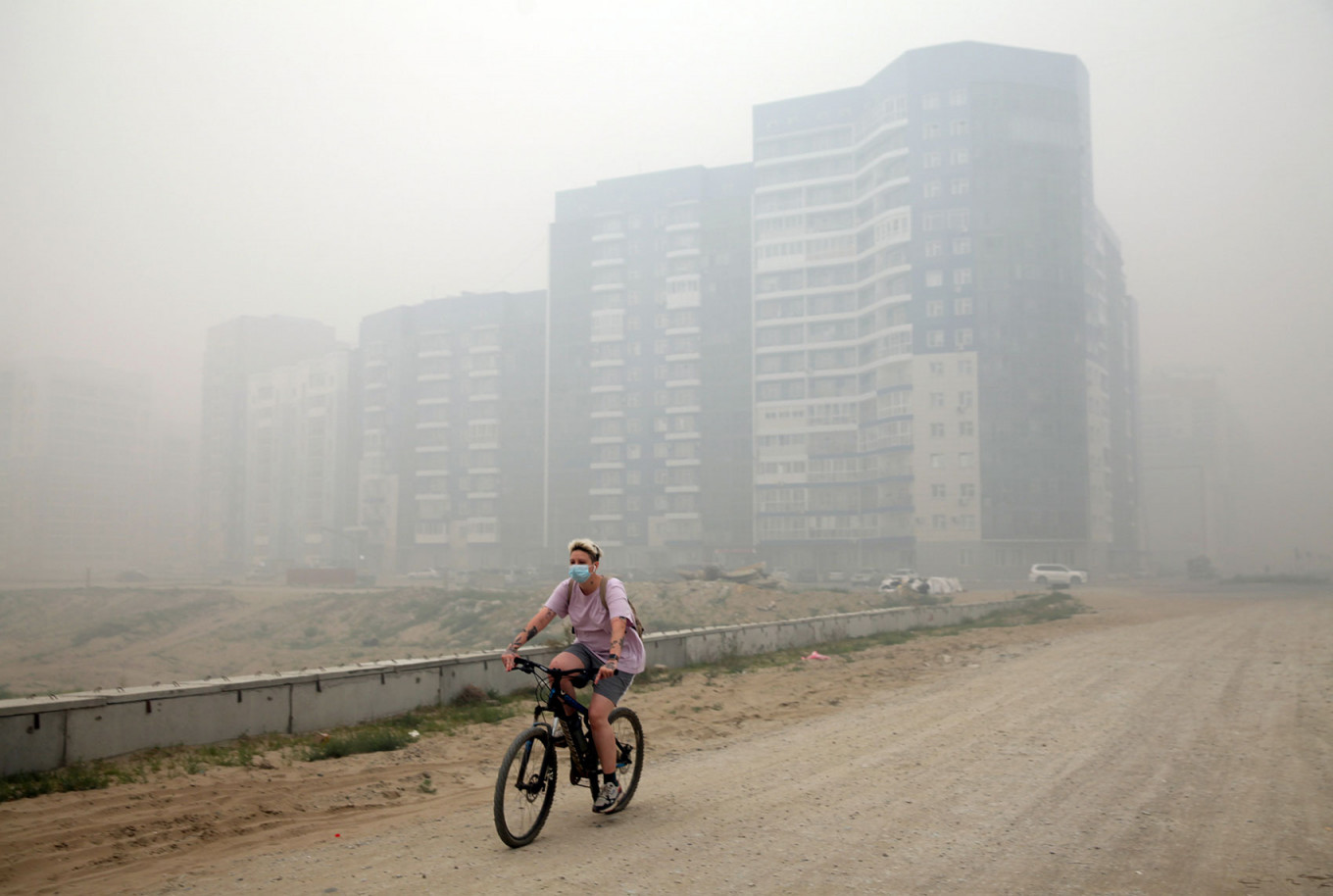
In Yakutsk, the regional capital of the republic of Sakha, fine particle concentrations in the air are now more than 70 times the maximum recommended safe level.
Vadim Skryabin / TASS
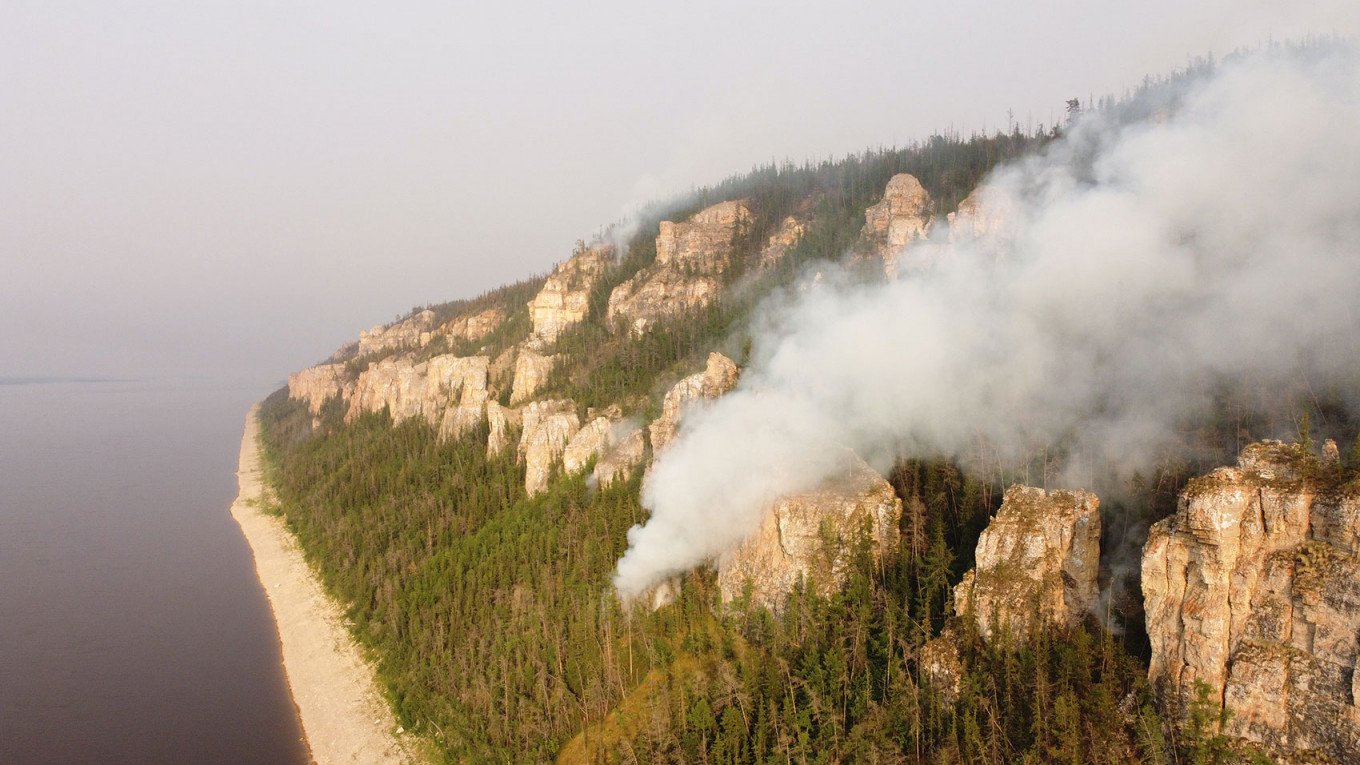
The wildfires have reached the Lena Pillars Nature Park, a UNESCO World Heritage site.
Vadim Skryabin / TASS
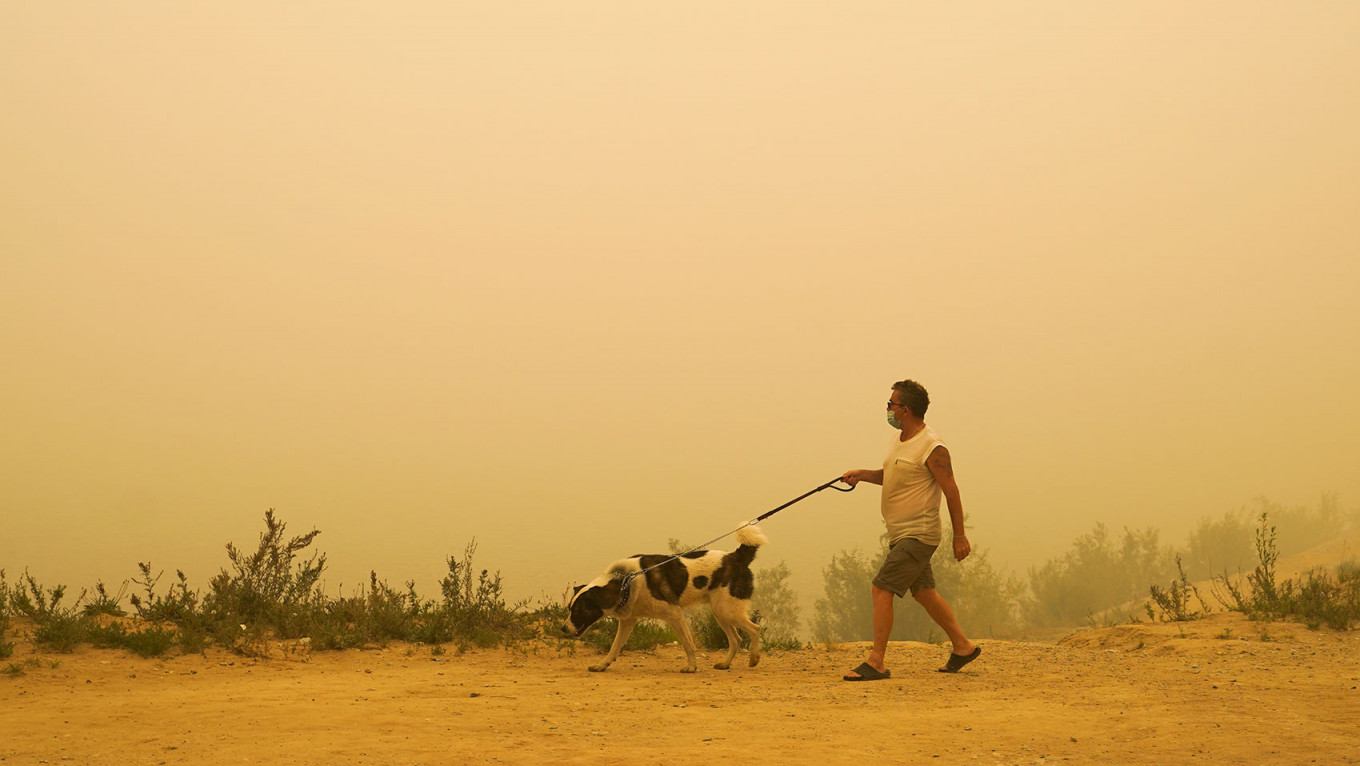
The head of the region ordered a non-working day on Friday in Yakutsk and 10 other municipalities, urging residents to stay at home due to the harmful effects that the smoke can have on human health.
Vadim Skryabin / TASS
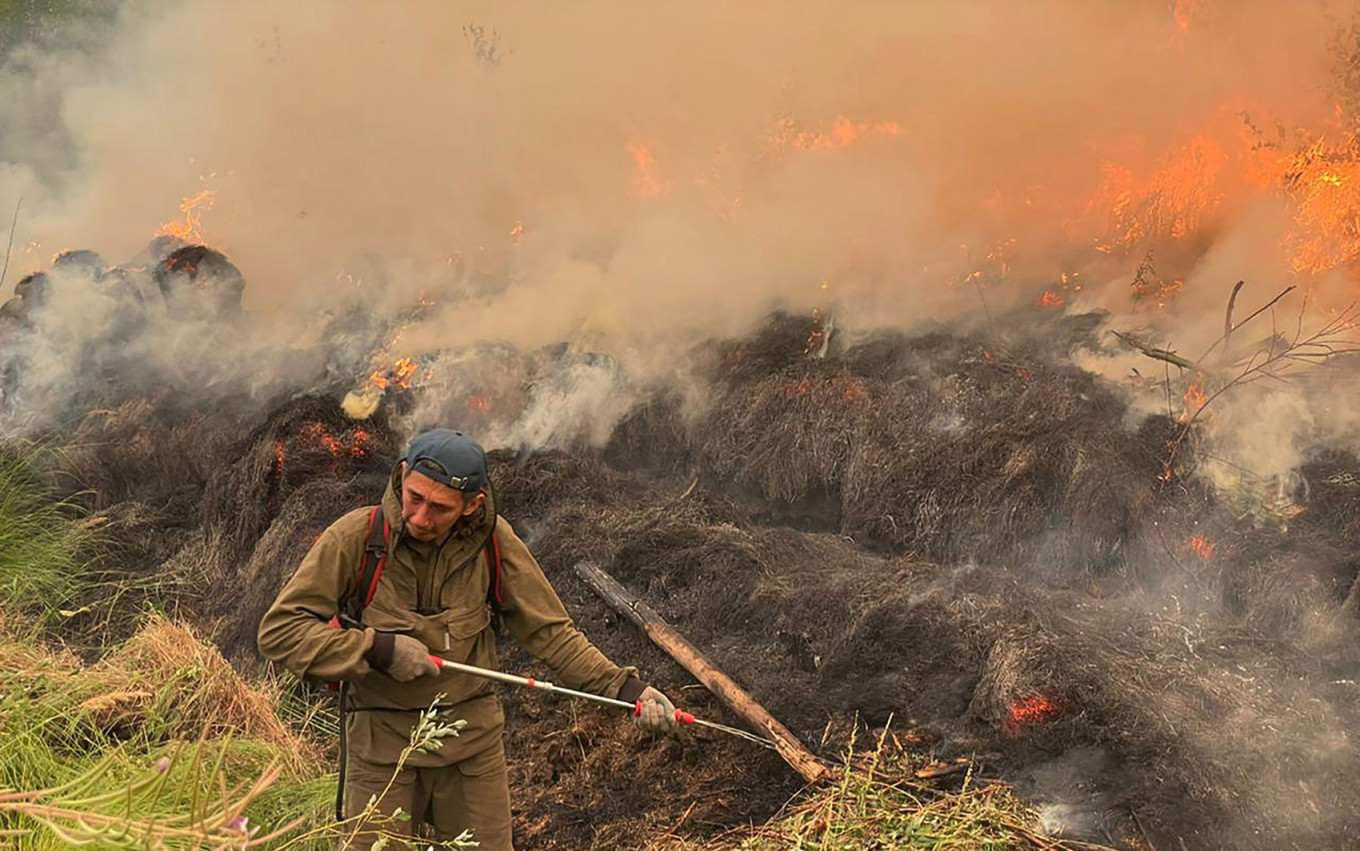
A Russian emergencies ministry employee battles a wildfire. The Siberian wildfires are now larger than the rest of the world's fires combined.
Russian Emergencies Ministry / TASS
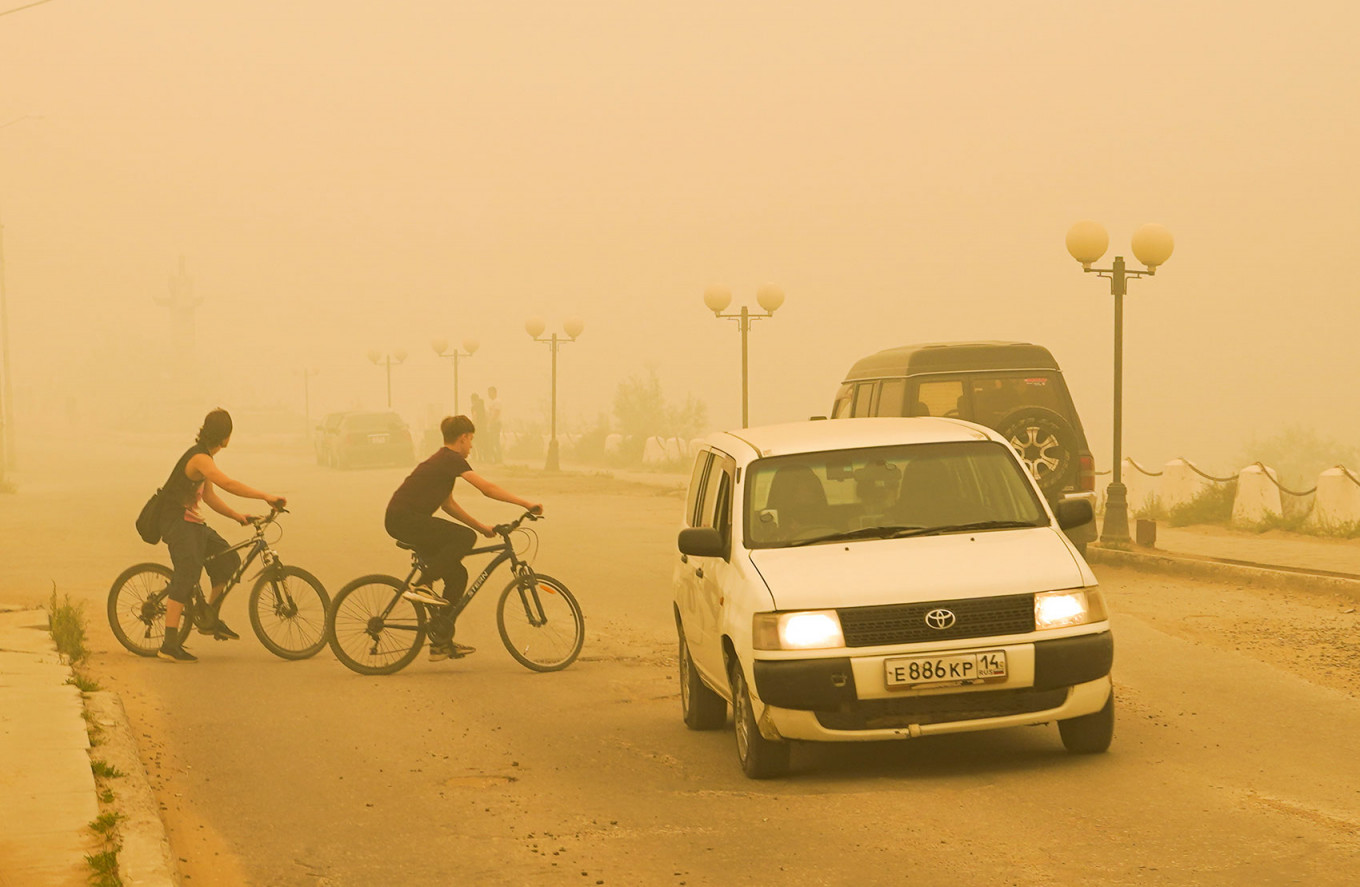
Flights to and from Yakutsk have been canceled or delayed due to poor visibility.
Vadim Skryabin / TASS
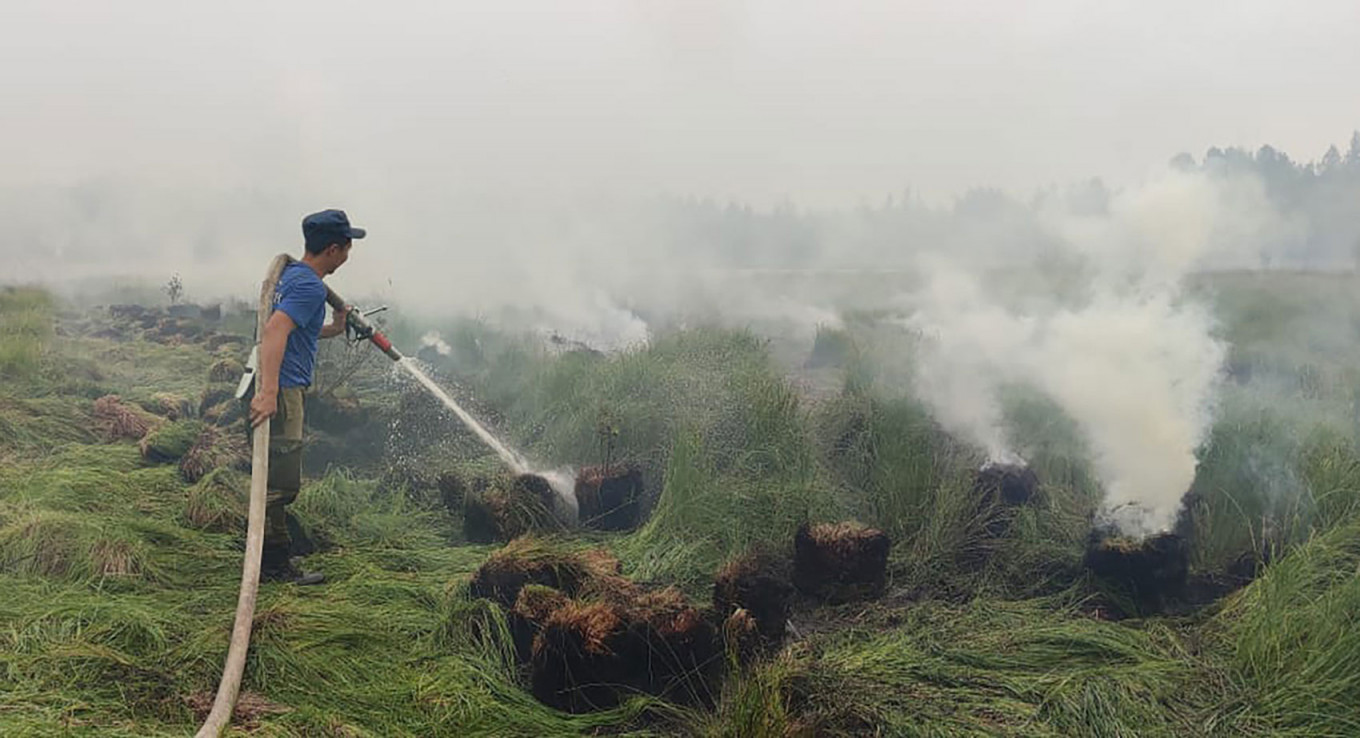
Earlier this week, President Vladimir Putin ordered to send reinforcements to the region, but experts say the largest fires will be impossible for humans alone to extinguish.
Russian Emergencies Ministry / TASS
The Moscow Times
Updated: Aug. 12, 2021

The republic of Sakha (Yakutia), Russia’s largest and coldest region, has been devastated by unprecedented wildfires this summer.
Ivan Nikiforov / TASS
A wildfire raging in northeastern Siberia could become the largest in recorded history, experts from Greenpeace Russia told The Moscow Times on Wednesday.
The republic of Sakha (Yakutia), Russia’s largest and coldest region, has been devastated by unprecedented wildfires that are now larger than the rest of the world's blazes combined. Residents have been under a state of emergency for weeks as thick, acrid smoke blankets settlements and reaches cities thousands of kilometers away, while thousands of volunteers have been recruited to fight the fires
A wildfire raging in northeastern Siberia could become the largest in recorded history, experts from Greenpeace Russia told The Moscow Times on Wednesday.
The republic of Sakha (Yakutia), Russia’s largest and coldest region, has been devastated by unprecedented wildfires that are now larger than the rest of the world's blazes combined. Residents have been under a state of emergency for weeks as thick, acrid smoke blankets settlements and reaches cities thousands of kilometers away, while thousands of volunteers have been recruited to fight the fires
The largest of these fires has exceeded 1.5 million hectares in size, the Greenpeace environmental group's forestry head Alexey Yaroshenko told The Moscow Times.
“This fire has to grow by about 400,000 hectares to become the biggest in documented history,” Yaroshenko said. “It is impossible to contain this fire through human efforts. ... Firefighters would have to put out a line of fire 2,000 kilometers long.”
Only rain could stop or significantly slow down this fire, Yaroshenko said, but current rainfall is too weak to do so.
“In the best-case scenario we could save settlements and infrastructure that lies in the fire’s path,” he said.
Yaroshenko’s comments come days after a landmark United Nations climate report rang the alarm on global warming and called for more ambitious measures to prevent the climate from spiraling out of control.
Experts say Sakha’s fast-warming climate — the region has seen its annual average temperature rise by 3 degrees Celsius since the beginning of the 20th century — combined with a 150-year record drought and high winds has turned its vast taiga forest into a tinderbox.
Harmful forestry practices are a key factor behind the fires’ unprecedented spread, Greenpeace expert Yulia Davydova told The Moscow Times, as regional authorities aren’t required to extinguish fires in so-called “control zones” – areas far from human settlements. Logging, both illegal and legal, is another common cause, according to new data acquired by Greenpeace.
With weeks left to go in the wildfire season, the European Union’s Copernicus satellite monitoring service said that the Siberian forest fires have already emitted a record 505 megatons of carbon dioxide.
And satellite observations by NASA’s Earth-monitoring tool MODIS showed that smoke from the wildfires reached the North Pole for what is believed to be the first time in known history last week.
Nationwide, over 13.4 million hectares of land have been burned by wildfires — an area roughly the size of Greece — so far in 2021, Greenpeace says, citing official data.
Putin Alarmed Over 'Unprecedented' Natural Disasters in Russia
By AFP Updated: one day ago

Ivan Nikiforov / AP Photo / TASS
President Vladimir Putin on Saturday said the scale of natural disasters that have hit Russia this year is "absolutely unprecedented" as local officials ask for Moscow's help to tackle fires and floods.
A former skeptic of man-made climate change, the Russian leader called on authorities to do everything possible to help Siberians affected by the region's gigantic wildfires, as well as Russians living in the flood-hit south of the country.
Speaking at a video conference with the leaders of the affected eastern and southern regions, Putin said he received daily reports on the climate situation in the country.
"In the south (of Russia), the monthly norm of rainfall now falls in a few hours and in the Far East on the contrary, forest fires in drought conditions are spreading rapidly," Putin said.
In Russia's largest and coldest region of Yakutia, this summer's forest fires have already burned through an area larger than Portugal.
Russian weather officials and environmentalists have linked the increasing intensity of Siberia's annual fires to climate change.
"All of this once again shows how important it is for us to deeply and systematically work on the climate and environment agenda," he said.
He called on authorities to be ready to evacuate more people living in areas affected by the fires — especially the elderly — as well as provide economic support for them.
He also asked officials to calculate the effects of the fires and make plans to reconstruct houses.
The Russian leader said it was important to do everything to "save the forest riches" and "minimise damage for animals of the taiga", a word used to describe northern Russian forests.
Hundreds evacuated
Local officials pleaded for reinforcements and Moscow's economic help to deal with the human cost of damage caused by extreme weather.
President Vladimir Putin on Saturday said the scale of natural disasters that have hit Russia this year is "absolutely unprecedented" as local officials ask for Moscow's help to tackle fires and floods.
A former skeptic of man-made climate change, the Russian leader called on authorities to do everything possible to help Siberians affected by the region's gigantic wildfires, as well as Russians living in the flood-hit south of the country.
Speaking at a video conference with the leaders of the affected eastern and southern regions, Putin said he received daily reports on the climate situation in the country.
"In the south (of Russia), the monthly norm of rainfall now falls in a few hours and in the Far East on the contrary, forest fires in drought conditions are spreading rapidly," Putin said.
In Russia's largest and coldest region of Yakutia, this summer's forest fires have already burned through an area larger than Portugal.
Russian weather officials and environmentalists have linked the increasing intensity of Siberia's annual fires to climate change.
"All of this once again shows how important it is for us to deeply and systematically work on the climate and environment agenda," he said.
He called on authorities to be ready to evacuate more people living in areas affected by the fires — especially the elderly — as well as provide economic support for them.
He also asked officials to calculate the effects of the fires and make plans to reconstruct houses.
The Russian leader said it was important to do everything to "save the forest riches" and "minimise damage for animals of the taiga", a word used to describe northern Russian forests.
Hundreds evacuated
Local officials pleaded for reinforcements and Moscow's economic help to deal with the human cost of damage caused by extreme weather.
Aysen Nikolayev, the head of Yakutia, said firefighters were able to save 230 houses from flames.
He said evacuated villagers had received psychological help, with local children being sent to holiday camps.
He called the scale of the fires a first "in history" and asked for help after the region's harvest was severely affected.
"We will continue to save more houses," he said, thanking Putin for his support.
This week Russia launched a national response centre and deployed additional firefighters to battle the devastating Siberian fires.
The governor of the southern Krasnodar region Veniamin Kondratyev said 132 people — mostly holidaymakers — had been evacuated in the Black Sea resort of Anapa last night amid rising floods.
"We could not predict what would happen at night," he said, adding that the region had "the same rainfall in a day as we usually get in a year."
Kondratyev said that despite difficult climate conditions, the holiday season in resort areas is "continuing and under control."
The head of Moscow-annexed Crimea, Sergei Aksyonov, said that two people have died as a result of floods on the peninsula and that over 3,000 have asked authorities for help.
Heavy smog hung over the regional capital of Yakutsk on Friday, which was declared a non-working day in much of the region over health concerns due to wildfire smoke.
For years Putin was notorious for his scepticism about man-made global warming and saying Russia stands to benefit from it.
But in recent months he has also made statements to the effect that climate change is not just a boon to Moscow.
The Russian leader this year participated in a summit hosted by U.S. President Joe Biden and said Moscow is interested in "stepping up international cooperation" on climate change.

Smog from the wildfires in Yakutsk.
Vadim Skryabin / TASS
In Photos: Life Amid Siberia's Devastating Wildfires
Aug. 13, 2021 - 15:32
Russia’s largest, coldest region is blanketed by thick smoke from wildfires that have torn across the Siberian taiga at an unprecedented scale.
Authorities the republic of Sakha (Yakutia) have declared a state of emergency over the rapidly advancing fires and hazardous smoke.
Here’s a closer look at the scene from the ground that locals have described as “apocalyptic”:

In Yakutsk, the regional capital of the republic of Sakha, fine particle concentrations in the air are now more than 70 times the maximum recommended safe level.
Vadim Skryabin / TASS

The wildfires have reached the Lena Pillars Nature Park, a UNESCO World Heritage site.
Vadim Skryabin / TASS

The head of the region ordered a non-working day on Friday in Yakutsk and 10 other municipalities, urging residents to stay at home due to the harmful effects that the smoke can have on human health.
Vadim Skryabin / TASS

A Russian emergencies ministry employee battles a wildfire. The Siberian wildfires are now larger than the rest of the world's fires combined.
Russian Emergencies Ministry / TASS

Flights to and from Yakutsk have been canceled or delayed due to poor visibility.
Vadim Skryabin / TASS

Earlier this week, President Vladimir Putin ordered to send reinforcements to the region, but experts say the largest fires will be impossible for humans alone to extinguish.
Russian Emergencies Ministry / TASS
The Moscow Times
No comments:
Post a Comment